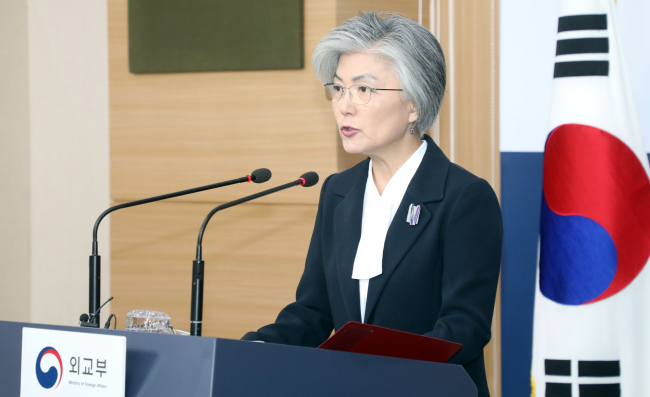 |
South Korea's Foreign Minister Kang Kyung-hwa (Yonhap) |
Foreign Minister Kang Kyung-wha on Monday reiterated South Korea's determination to forge ahead with its push for lasting peace on the divided peninsula, to which she calls Pyongyang's denuclearization "integral."
Kang made the remarks amid stalled inter-Korean relations and a drawn-out deadlock in nuclear negotiations between Washington and Pyongyang, both of which have thrown into doubt Seoul's dogged pursuit of greater trust and economic cooperation with Pyongyang.
"The Korean Peninsula peace process of my government seeks to turn this fragile peace into a permanent peace grounded on a formal peace accord that will replace the armistice," Kang said during a keynote speech for a forum on multilateral cooperation.
"Getting North Korea to completely denuclearize is an integral part of the process," she added.
Noting "ups and downs" in the peace efforts and the current standoff with Pyongyang, Kang said that South Korea is "staying the course" and determined to solidify the groundwork for the process "slowly but surely."
"We are doing so in close consultation with the United States and the neighboring countries and firmly based on the solid combined defense posture of the ROK-US alliance," the minister said. ROK stands for South Korea's official name, Republic of Korea.
Kang was attending the forum on multilateralism amid geopolitical rivalries in the post-pandemic era, organized by the ministry-affilated Institute of Foreign Affairs and National Security.
The minister voiced concerns about the erosion of multilateralism, pointing to the "downward spiral in superpower relations," which she said has been "destabilizing" for multilateral organizations.
"What concerns foreign policy actors the most must be the rising tension between the big powers," Kang said in an apparent reference to the Sino-US rivalry.
"What started in trade disputes has now escalated into a rivalry that encompasses a whole range of issues in economic, technology, military, security, political, and public health sectors," Kang added.
Kang stressed that South Korea's approach is to "shore up multilateralism and expand cooperation with no other goal than peace and co-prosperity with all others."
In another show of her support for multilateralism, the minister stressed that her country owes much of its transformation "from a war-devastated poor country into a prospering market economy and vibrant liberal democracy" to the global multilateral order.
"We are thus firm believers in multilateralism and globalization, and we are joining our voice and capacity with others who share the same concern over the erosion of multilateralism," she said. (Yonhap)






![[Herald Interview] 'Trump will use tariffs as first line of defense for American manufacturing'](http://res.heraldm.com/phpwas/restmb_idxmake.php?idx=644&simg=/content/image/2024/11/26/20241126050017_0.jpg)
![[Exclusive] Hyundai Mobis eyes closer ties with BYD](http://res.heraldm.com/phpwas/restmb_idxmake.php?idx=644&simg=/content/image/2024/11/25/20241125050044_0.jpg)
